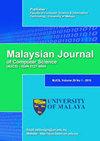UTILIZATION OF MOBILE AUGMENTED REALITY IN A COURSE CONTENT: AN IMPACT STUDY
IF 1.2
4区 计算机科学
Q4 COMPUTER SCIENCE, ARTIFICIAL INTELLIGENCE
引用次数: 0
Abstract
With the rapid evolution of interactive technology, the popularity of mobile augmented reality (MAR) as a learning aid has continued to grow. However, several studies have revealed that research on the impact of AR in the educational domain is both insufficient and in an early phase. More studies are required to evaluate the effectiveness of utilizing MAR in this domain. The purpose of this study was to measure the effect of a mobile training course designed using MAR on trainees’ motivation. We reviewed the associated concepts, highlighted the importance and effectiveness of MAR and explained the benefits and challenges of employing MAR in the educational domain. This study drew on John Keller’s motivational model components and emphasized the significance of intrinsic motivation. We used a quantitative approach and designed a mobile training course that uses MAR to train government employees in Oman. A total of 32 employees were randomly divided into an experimental group and a control group. The experimental group used the designed application, and the control group took a training course online via computers. A motivational survey was conducted, and SPSS statistical software was used for data analysis. The results revealed that there was a significant difference in the mean motivation value for the experimental group: the trainees from the experimental group were more motivated than those from the control group. This study confirms that learners are motivated to participate in mobile training courses designed using MAR, which can contribute to the development of human resources in various domains.移动增强现实在课程内容中的应用影响研究
随着交互式技术的快速发展,移动增强现实(MAR)作为一种学习辅助工具的受欢迎程度持续增长。然而,几项研究表明,对AR在教育领域的影响的研究既不够充分,也处于早期阶段。需要更多的研究来评估在该领域使用MAR的有效性。本研究的目的是测量使用MAR设计的移动培训课程对学员动机的影响。我们回顾了相关概念,强调了MAR的重要性和有效性,并解释了在教育领域使用MAR的好处和挑战。本研究借鉴了约翰·凯勒的动机模型组成部分,强调了内在动机的重要性。我们采用定量方法,设计了一个移动培训课程,使用MAR培训阿曼的政府雇员。共有32名员工被随机分为实验组和对照组。实验组使用设计的应用程序,对照组通过电脑在线学习培训课程。进行动机调查,并使用SPSS统计软件进行数据分析。结果显示,实验组的平均动机值存在显著差异:实验组的学员比对照组的学员更有动机。这项研究证实,学习者有动机参加使用MAR设计的移动培训课程,这有助于开发各个领域的人力资源。
本文章由计算机程序翻译,如有差异,请以英文原文为准。
求助全文
约1分钟内获得全文
求助全文
来源期刊

Malaysian Journal of Computer Science
COMPUTER SCIENCE, ARTIFICIAL INTELLIGENCE-COMPUTER SCIENCE, THEORY & METHODS
CiteScore
2.20
自引率
33.30%
发文量
35
审稿时长
7.5 months
期刊介绍:
The Malaysian Journal of Computer Science (ISSN 0127-9084) is published four times a year in January, April, July and October by the Faculty of Computer Science and Information Technology, University of Malaya, since 1985. Over the years, the journal has gained popularity and the number of paper submissions has increased steadily. The rigorous reviews from the referees have helped in ensuring that the high standard of the journal is maintained. The objectives are to promote exchange of information and knowledge in research work, new inventions/developments of Computer Science and on the use of Information Technology towards the structuring of an information-rich society and to assist the academic staff from local and foreign universities, business and industrial sectors, government departments and academic institutions on publishing research results and studies in Computer Science and Information Technology through a scholarly publication. The journal is being indexed and abstracted by Clarivate Analytics'' Web of Science and Elsevier''s Scopus
 求助内容:
求助内容: 应助结果提醒方式:
应助结果提醒方式:


